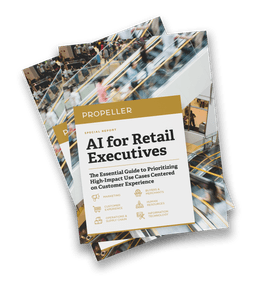While tech companies routinely collect data, transforming this data into AI-ready assets has become essential for gaining a competitive advantage. Yet, many organizations preparing to launch an AI solution find that they lack the fundamental data infrastructure necessary to advance their AI use cases. For many organizations, the pressure to adopt AI is revealing long-standing data issues, blind spots, and organizational unreadiness. As a result, firms are experiencing unwanted delays in launching new initiatives.
To move forward with AI solutions—and whatever technological advancements may come next—organizations must first connect data to strategy. The challenge for many organizations is recognizing that they can’t move forward on strategy until they build a stronger data foundation.
Related Content: Data & Analytics Trends: How Leading Companies Are Powering What’s Next
# Are You Accumulating Organizational Data or Delivering Value?
For tech organizations working with data day in and day out, it’s easy to feel blindsided by pitfalls in data strategy. Companies experiencing rapid growth often delay work on data strategy and governance, focusing instead on sales-generating activities. However, these same organizations often find that when they are ready to launch a data-driven program, any data they do have is messy, incomplete, or underutilized.
Propeller was recently invited to work with an organization that had been accumulating data for years. Yet rather than delivering value, the data collection efforts had created new pain points within the organization. Instead of speeding decision-making, the quality of available data lowered confidence in data-driven decisions. Data collection had not led to process automation but had actually created new types of manual work. Teams grew frustrated by daily problems caused by poor data governance and quality.
When Propeller stepped in, it was already clear to technical teams that the organizational data wouldn’t support the data initiatives executives had hoped to launch. What wasn’t clear was how this mismatch had happened.
Propeller's comprehensive assessment revealed the fundamental disconnect: years of unfocused data accumulation had created organizational chaos rather than strategic value. Our analysis revealed that poor data governance and quality issues actively undermined confidence in data-driven decisions.
Working with teams across the company, Propeller facilitated strategic discussions that helped leadership and technical teams identify the data that mattered most for market opportunities. Through this collaborative process, the organization shifted from endless data collection to building a focused strategy for deriving actionable insights. Now, instead of just accumulating data, the organization has a clear roadmap for how to transform data points into valuable business intelligence.
Related Content: Building a Secure AI Technology and Data Ecosystem: What Business Leaders Need to Know
# Is the Focus on Data Moving Top-Down or Bottom-Up?
A focus on accumulating as much data as possible often emerges when data collection efforts are driven by technical teams. There is an expectation that, over time, after organizations have amassed enough data to identify trends, value will emerge. Yet, without a clear plan for how this data will be used, technical teams risk becoming stuck in endless data accumulation, losing sight of their strategic goals.
Some of this disconnect can be bridged by using a shared, organization-wide language that brings teams together. Rather than tracking unique key performance indicators (KPIs) across departments, organizations can align efforts around specific hero metrics. These are prioritized KPIs that can advance organizational goals. Hero metrics:
- Have value (and common definitions) across departments.
- Drive business activity.
- Influence organizational success and profitability.
- Deliver insight into organizational health.
Hero metrics also provide technical teams with clear insight into how executives will utilize the collected organizational data.
For example, customer lifetime value is a hero metric that holds significance for finance, marketing, sales, fulfillment, and other departments. Although the data points collected to measure this metric will vary across departments, it creates a shared, organization-wide goal toward which both technical and operational teams, as well as leadership, can work. With a shared objective guiding strategy, technical teams can build the components required to collect data of the quality and variety that leadership can utilize.
Related Content: Knowledge Management Maturity for AI Readiness: A Strategic Guide for Tech Leaders
# Moving Beyond the Chaos: The ROI of Organizational Data Readiness
Many organizations are aware that their data isn’t fully ready to support AI initiatives. However, few organizations understand the full extent of their data issues, which can significantly hinder their goals.
In one recent example, Propeller was tasked by a board of directors with delivering insight into a specific metric to advance the entire organization toward a key business goal. After years of collecting data, the technical team believed they were nearing the delivery of a valuable dashboard. However, the team soon learned that a large volume of raw data doesn't automatically translate into readily usable information.
Through our assessment, several issues became clear. Among other factors, the board sought insight into a new metric that had been adopted by the financial team but was not yet in use organization-wide. As a result, some departments were not yet tracking the necessary data. As we worked with the technical team to examine which metrics were being tracked, they realized historical snapshots of data were not being stored. It became apparent that it would take years for their data to support predictive analytics due to the missing foundational elements. Today, the technical team is building the data engineering pipelines that will bring teams in line and deliver insight that executives can act on.
This organization is hardly alone in recognizing that its data collection work is not ready to support strategy. However, organizations in the early stages of evaluating data-driven initiatives have an opportunity to align this work with their organizational strategy.
Organizations aware of their data gaps have a critical advantage: they can begin building a robust data foundation, tailored to their strategic goals, today. Moving beyond data accumulation to data-driven insights requires a clear vision, targeted metrics, and organizational alignment around data readiness.
Propeller provides a holistic framework to guide your teams through this transformation, from cleaning data and strengthening governance to fostering a data-first culture. If you’re ready to build a map for turning data into value, Propeller’s experts can help.

AI for Retail Leaders: Use Case Guide
Learn how leading retailers are using AI to enhance CX, streamline operations, and deliver value.





